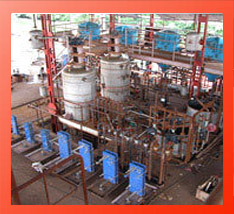EDIBLE OIL DEODORIZATION PROCESS & MACHINERY
 The process of vegetable oil deoderization is carried out through pressurized steam distillation, for around 30 to 60 minutes, at the temperatures of 240°-270°C (464-518°F). This process removes the un-required tastes and odors from the oil. It also minimizes the content of various substances such as toxins, residues, & oxidation products formed while the bleaching stage. With this process monoglycerides, sulphur, beta carotene, sterols, and tocopherols (Vitamin E) are also removed. At this point, the oil is tasteless and is absolutely not distinguishable from the other oils that have been derived from plants or seeds. The oil acquired at this step can be sold as "cold-pressed" oil. For the prevention of turbidity while refrigeration, a defoamer is added.
The process of vegetable oil deoderization is carried out through pressurized steam distillation, for around 30 to 60 minutes, at the temperatures of 240°-270°C (464-518°F). This process removes the un-required tastes and odors from the oil. It also minimizes the content of various substances such as toxins, residues, & oxidation products formed while the bleaching stage. With this process monoglycerides, sulphur, beta carotene, sterols, and tocopherols (Vitamin E) are also removed. At this point, the oil is tasteless and is absolutely not distinguishable from the other oils that have been derived from plants or seeds. The oil acquired at this step can be sold as "cold-pressed" oil. For the prevention of turbidity while refrigeration, a defoamer is added.
The last stage of the vegetable oil purification is known as hydrogenation. In this process, the shortenings, margarines, and shortening oils are made. The oil hydrogenation converts the liquid oil in the hard fats, with the addition of hydrogen to fat molecules. On the basis of the hardness of the oils, they can be hydrogenated to a range of degrees. The general forms include margarines, shortening and the partially hydrogenated fats that find usage in frying as well as in processed foods. The said fats are demanded for their melting point which allows cooking and frying at high temperatures.
The process of hydrogenation includes complete artificial saturation of the fully refined oils for hardening them into the spreadable products. Amongst all the oils that are available in the markets, only olive oil is the one, which is not heated above 1500C. But, this oil does not have the important fatty acids and contains 10% LA and 0.5% LNA, on an average. Various oils that are available in the market include:
- Safflower
- Walnut
- Sunflower
- Corn
- Grape seed
- Soybean
- Sesame
- Rice bran
- Canola
- Almond
- Peanut
- Avocado, and others including blends.
After the completion of the oil deoderization and hydrogenation refining processes, following activities are carried out on the refined oils:
- For 6 to 8 hours, oils are put under pressure using the hydrogen gas at temperatures of 120-210°C (248-410°F).
- This is done in the presence of a metal catalyst such as nickel, platinum, or copper. A nickel catalyst is basically 50% nickel & 50% aluminum, both of which remnants remain in the final products
- During the process of complete hydrogenation, the saturation of double bonds takes place with hydrogen. This directly implies the absence of unsaturated fatty acids, w6's, & w3's.
